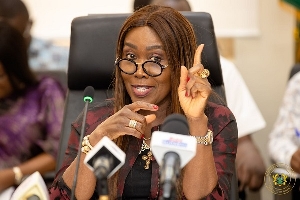- Home - News
- TWI News | TV
- Polls
- Year In Review
- News Archive
- Crime & Punishment
- Politics
- Regional
- Editorial
- Health
- Ghanaians Abroad
- Tabloid
- Africa
- Religion
- Election 2020
- Coronavirus
- News Videos | TV
- Photo Archives
- News Headlines
- Press Release
Opinions of Thursday, 1 October 2020
Columnist: Nyadroh Setor
Partnerships in education and resilience
Ghana has in recent years made a leapfrog in its educational frontier, access to both primary and second cycle institutions is almost ubiquitous in the country.
While this feat is commendable, the conversation must not end with access. Secondary education has become a key platform for young people to enter the world of work. Arguably, the question of how best to equip our young people with the skills they need to perform or create a dignified work in a dynamic world has never been more important. A recent publication by the Mastercard Foundation reports that of the 98% of young people who enroll at the primary level in Sub-Saharan Africa only 9% make it to tertiary level. Currently, secondary education is inadequate and has proved inefficient in its results. Inadequate, because it fails to provide facilities for that education which is essential.
The over a 100,000 unemployed graduates currently engaged under Nation Builder’s Corps to be retrained is a proof of how the current educational system has been inadequate. I must emphasize that this is not a recrimination but only a discussion about a path forward in improving our educational system.
We need to re-imagine existing structures of our schools to the needs of the diverse cohorts of students and provide flexible pathways into, between and beyond secondary education. Secondary education must aside producing a literate population have key structures for tackling the environmental causes of low productivity and producing the knowledge needed to harness Ghana’s economic potential.
Government has sought to keep young people in school through the School Feeding Program but then we need to do more to ensure that they are not just coming to school to eat but we are also enhancing their experience and broadening their horizon. The biblical narration by John the Apostle explains this phenomenon where after Jesus fed the multitude and they saw that neither He nor His disciple were no longer there, the multitude sought to look for Him. But Jesus knowing that said “… ye seek Me, not because ye saw the miracles, but because ye did eat of the loaves, and were filled” We must consciously seek to focus our attention now on prioritizing equipping our schools with multi-sports infrastructure (i.e. basketball courts, long tennis courts, football pitches, swimming pools et cetera) instead of investing in building fence walls. An illuminating statistics published by Statista in 2020 revealed that in 2018, the global sports market was valued at approximately 471 billion U.S. dollars. The question now is what are we doing that would churn out the great sports personalities like Lebron James, Roger Federer, Naomi Osaka, Asamoah Gyan, Ferdie Adoboe et cetera.
It is not enough to just seek to produce a literate population but we must also seek to nurture and amplify the skills and talents of our young ones which will not only harness Ghana’s economic potential but also reduce unemployment drastically in the country. Also aside the many benefits of having sports facilities in our schools research has shown that it can be a veritable tool to boosting school enrolment and reducing out of school children.
It is also critical that we integrate traditional education with respect to the traditional setting because it is intertwined with life activities in the community into secondary education. We must begin to form partnerships with community and community craftsmen to provide further outlets for our young children which will give them an opportunity to learn something of engineering (i.e. construction of boat, plumbing, carpentry, welding et cetera), tropical agriculture (i.e. fishing, mushroom and snail farming et cetera) and of tropical medicine and hygiene whiles establishing resource centers that validate the knowledge acquired through these studies.
It is also vital to note that, participation in some of these numerous activities in the community would help participants invariably learn new things.
This is essential to building the resilience and synergy that will create the innovation, and prosperity in the informal sector and in accelerating Ghana’s route for technological and economic growth towards achieving the Sustainable Developmental Goals SDG’s and African Union agenda 2063. Only with a population so educated can we hope to face the tremendous problems and raise the standard of life of every Ghanaian.











